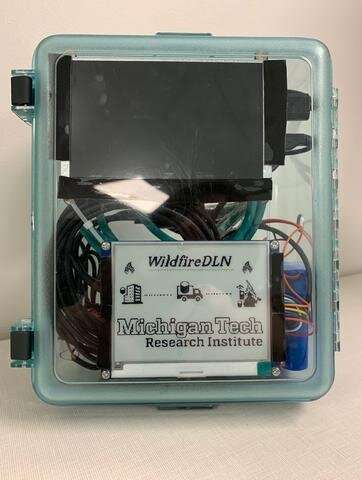Wildland Data Logistics Network: Always there with delay

Since 2000, an average of 72,000 wildfires per year have cleared seven million acres of land in the United States. 2015 was the largest wildfire year in recorded American history, with more than 10 million acres of land burned and 30,000 firefighters mobilized in response. As climates become warmer and drier, wildfires are expected to increase, along with the demand for firefighting services. Many wildfires take hold in remote, hard-to-reach areas where firefighters cannot easily transmit and receive the critical data that helps them make life and property-saving decisions.
Firefighters need to access accurate, up-to-date maps in the heat of the fight—and on the front lines—even when they may be miles from the nearest available network connection. This is the subject of a PSCR Public Safety Innovation Accelerator (PSIAP) awarded project, the Wildland Fire Data Logistics Network (Wildfire DLN), led by Principal Investigator Nancy French of the Michigan Tech Research Institute. Her team's work serves to develop a system intended to deliver rich and informative data to first responders working on the "edge"—such as firefighters on the front lines of a wildfire.
The Power of Up-to-date Data
"Firefighters face a lot of challenges when it comes to network connectivity, and they need a lot of data to do their jobs," explained French. Often, the geospatial data that firefighters need to understand a wildfire landscape comes in the form of massive files that take precious time to download and transfer. Subsequently, the team from Michigan Tech sought to create a system that would be resilient to an unpredictable, inconsistent signal subject to drops.
The PSIAP award led to Michigan Tech's prototype, a "data ferry" which is intended to transmit data to the front line. French explains, "The idea that firefighters can have a GIS interface on their phone opens a huge opportunity for information that has not been tapped into before." For the most part, firefighters are depending on paper maps—which may contain out-of-date information or basic flash-drive technology to receive information that informs their critical emergency response decision making.
French states, "One of the most important aspects to keep in mind is that data changes. So, for firefighters to be most effective at their jobs, they need the most up-to-date information. This ferry is a way to bring them that capability. We feel that the more information they have, the better and safer they'll be in completing their missions." Current, up-to-date data could offer better predictions of wildfire behavior, thus contributing to more informed first responders and operational awareness. The data ferry is engineered to facilitate resilient data sharing—simplifying access to large, updated files where transfer is normally slow or prohibited due to connectivity limitations or insufficient bandwidth.
"Always there with delay"
Michigan Tech's data ferry is a field prototype. It has a single-board computer with the ability to provide powerful computing and telecommunications services. The data ferry works with a base station that is administratively facing, where public safety officials can plug directly into a desktop or laptop and provide functionality to the system for an access point. The ferry provides an ingress and egress wireless interface allowing data to go from the base station to the ferry and from the ferry to the end user. When a first responder uploads a file from the base station to the ferry, that file will transfer to the ferry while in range and is pushed to end users once they are able to connect.
The system operates as a delayed continuous connection that could serve as a vital conduit to decision-makers on the ground, especially in emergency situations where standard LTE or WiFi networks are down or otherwise unavailable. French describes the resiliency of the Wildfire DLN simply as, "'Always there with delay,' in other words, when a first responder needs to get a file, they might not have connectivity; but, with the ferry, they can request a resource, wait for a ferry to come into sight, and then the data will be transferred automatically. This really explains the concept of the entire idea—to guarantee that data will always be there without much work, even if you have to wait for it."
The overall goal of the project is that good data is delivered to first responders with little-to-no user anxiety. The Michigan Tech team seeks to simplify firefighters' visualization of where they are and what is happening around them through access to important data. French hopes that her team's prototype will someday serve as an enhancement to firefighters' operational capabilities, rather than a distraction. She explains, "The technology is advanced, the software development is complex; but, the bottom line is user experience." The intention is for the data ferry to facilitate seamless data transfer to the user. As French puts it, "We're successful if we're invisible."
Recently, in partnership with Brad Schmidt and the Colorado Wildfire Center of Excellence (COE), the team performed a successful demonstration of the prototype data ferry. Michigan Tech has worked closely with COE to ensure that their project makes a real impact with the firefighting community. French explains that the ferry's benefits "are clear to firefighters, and we hope they will consume and critique the tool to fit their needs."
While Michigan Tech originally developed the data ferry to be used in a wildfire scenario, they are hopeful that their technology can be applied to other domains as well. The team has plans for additional use cases involving high-definition video transport in urban areas, where backhaul throughput is insufficient for the amount of data being transferred. The Michigan Tech team aspires to positively change first responder operations by providing more immediate data for decision-making in remote areas. French concludes, "it's really the decision-making from the data that's going to save the life or property—but our technology will facilitate that data-sharing."



















